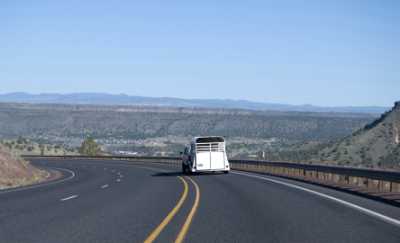|
By Jerry Tardif

Trailering Down the Road.
This is a question many horse owners ask when trailering their horse(s).
And with good reason, because you want to assure your horses are ok.
But this is a more complex question than it may initially seem.
For example, here are some questions to consider:
- What's the temperature on your travel day(s)?
- Can you carry water on your trailer from which your horse(s) can drink while underway?
- Will your horse(s) drink while underway if you provide it for them (some won't drink while in a trailer)?
- If you do stop, are you planning to unload your horse(s)?
This raises its own set of questions:
- Must you unload them so they'll drink some water?
If it's hot and/or the air is very dry, they'll need water more frequently.
- Is it safe for the horses where you intend to stop and unload them?
- Could they get away and run into traffic?
- If you let them graze, is that safe?
Or has the grass been treated with chemicals for weeds, pests, to add fertilizers, or for some other reason — many of these chemicals are toxic.
If it's not safe to unload your horses, you should leave them on the trailer.
But you can't wait too long if they can't or won't drink water and the weather is hot.
You MUST know your horses and plan your stops BEFORE leaving and may even need to drive during the early morning hours or late day to avoid being stuck in a city during the middle of a hot day.
- Are you truly prepared?
You should know how to measure your horse's temperature, respiration rate, pulse, and degree of hydration (e.g. using the "pinch test").
You should occasionally perform these tests in your barn as a way to check your horse's condition when things don't seem right, and to know what's normal for your horse.
Only then can you determine if his odd behavior is related to his condition not correlating with his normal baseline and necessitating a call to your vet.
As a "rule of thumb", I think you should stop and check your horses at least every four or five hours.
You never know if they've got a leg caught or if their tail is stuck between the butt bar and the ramp and chaffing away — horses seem to easily get into trouble.
If it's hot during your travel, stop every two hours and assure your horses drink plenty of water.
Every stop is also an opportunity for the pinch test to see how they're doing before they get into serious trouble.
The foregoing is not a thorough treatise on what to do when trailering.
But it should give you an idea of the kinds of things you need to know and must be prepared to address when trailering horses.
And the longer your trip, the more important these considerations become.
Besides being an avid trail rider, Jerry Tardif is a technology consultant and a horse and nature photographer in SE Connecticut — see his work at: www.jerrytardif.com.
He is also co-founder and President of QueryHorse.
Back to Article Index
|